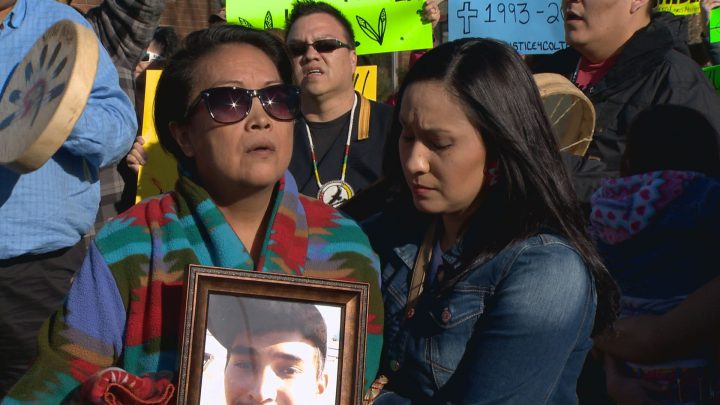On Feb. 9, a jury in North Battleford, Sask., acquitted white farmer Gerald Stanley of the murder of 22-year-old Indigenous man Colten Boushie.

According to witnesses, Boushie and three friends had driven onto Stanley’s rural property after a day of drinking. Their SUV got a flat tire, they attempted to steal a truck on a neighbouring farm, but then went to the Stanley property for help.
Stanley’s son testified that he and his father heard an ATV start up and thought it was being stolen; Stanley further told the court that he thought his wife had been run over in the confusion.
He went in the house, got a gun, shot it in the air as a warning, then ran up to the SUV. He claims the gun went off accidentally and shot Boushie in the back of the head.
The jury agreed, and found Stanley not guilty, to the horror of the courtroom packed with Boushie’s relatives and community.
WATCH: Colten Boushie’s family demands changes in the system

The verdict was not yet 24 hours old when the tweetstorm began. “Just spoke with @Puglaas. I can’t imagine the grief and sorrow the Boushie family is feeling tonight. Sending love to them from the US,” wrote Prime Minister Justin Trudeau.
“Thank you PM @JustinTrudeau,” Justice Minister Jody Wilson-Raybould tweeted. “My thoughts are with the family of Colten Boushie tonight. I truly feel your pain and I hear all of your voices. As a country we can and must do better — I am committed to working everyday to ensure justice for all Canadians.”
Then, from Indigenous Service Minister Jane Philpott: “Devastating news tonight for the family & friends of #ColtenBoushie. My thoughts & prayers are with you in your time of grief & pain. We all have more to do to improve justice & fairness for Indigenous Canadians.”
WATCH: Trudeau talks about his meeting with Colten Boushie’s family

Emotional words — and, sadly, inappropriate ones. Contrast this with the statement U.S. President Barack Obama made after the similarly-charged verdict exonerating Florida man George Zimmerman in the killing of unarmed black teenager Trayvon Martin.

Get breaking National news
“I know this case has elicited strong passions. And in the wake of the verdict, I know those passions may be running even higher. But we are a nation of laws, and a jury has spoken… I now ask every American to respect the call for calm reflection from two parents who lost their young son… And as we do, we should ask ourselves if we’re doing all we can to widen the circle of compassion and understanding in our own communities.”
The difference is striking. Not once did Trudeau call for calm, despite the protests breaking out all over the country; not once did he defend the system that underpins the very rights and freedoms his own father enshrined in the Charter of Rights.
Instead, he pandered to emotion and implicitly questioned the verdict, potentially tainting it from appeal — which would be the actual way to get justice for Boushie, if he believed the jury’s decision was wrong.
It is true that this government desperately wants to right the wrongs done to Canada’s First Nations communities, whether by the residential school system, the reserve system or the criminal justice system.
WATCH: Trudeau vows to reset Crown-Indigenous relations

But in the Boushie case, and much of its policy-making, its approach involves far too much grandstanding, too little action, and an abandonment of its own mantra: evidence-based policy-making.
Instead of looking at facts, and what they tell us needs to be done, Trudeau and his ministers prefer to trade on emotions — even inflaming them by their declarations. That is a public relations exercise that serves no one, least of all Indigenous Canadians themselves.
The tragic reality is that Indigenous Canadians are disproportionately represented as both victims and perpetrators of crimes in Canada. But when it comes to homicide, Indigenous Canadians are largely not being killed by non-Indigenous Canadians.
In its 2016 report on homicide, Statistics Canada reports that of 611 murder victims, 142, or 23 per cent, were Indigenous. Of the 303 persons accused of homicide, 169 — or 56 per cent — were Indigenous.
When we consider that 87 per cent of Indigenous homicide victims knew their killer (versus 81 per cent of non-Indigenous victims), it becomes clear that the vast majority of murders of Indigenous persons are committed by other Indigenous persons, particularly in reserve communities.
Thus while the gruesome killing of First Nations teenager Tina Fontaine in 2014, and the shooting of Boushie in 2016 — in which both the accused were white men — made the headlines, they are not typical of homicide of Indigenous victims.
When Debbie Baptiste, Boushie’s grief-stricken mother, told a rally in North Battleford, “White people — they run the court system. Enough. We’re going to fight back. Enough killing our people,” she is half right — the court system that found Stanley innocent is mostly white, but the killers of Indigenous victims are mostly not.
According to Statistics Canada: “Perpetrators of violence against Aboriginal people are most often other members of the Aboriginal community such as spouses, relatives, or friends of the victim, and as such, victimization among Aboriginal people in Canada is often regarded as a mirror image of Aboriginal offending.”
It is clear that this cycle of violence needs to be broken. But this will not be solved by changing the jury system (as the federal government is thinking of doing). It will not be done by tweeting out a condemnation of the verdict (as the Indigenous Services minister did) or questioning the entire legal system (as the justice minister did).
It will not even be done by meeting with the Boushie family, as the prime minister subsequently did.
WATCH: Family of Colten Boushie call for meaningful dialogue on First Nations racism

While their suffering is unimaginable, there are many other victims of tragedies who surely would seek a similar meeting — and aren’t getting one. (To wit: a 13-year-old Yazidi boy, Emad Mishko Tamo, posted a YouTube video asking to meet Trudeau on behalf of the thousands of Yazidi kids being held captive, raped, starved and tortured in his homeland. Tamo never heard back from the PMO, so he showed up at a town hall to try and get his five minutes of the PM’s time — which he finally did.)
Deaths like Boushie’s and that of hundreds of other Indigenous murder victims will only be prevented by breaking the cycle of violence in First Nations communities themselves.
Former Prime Minister Stephen Harper was wrong to say that “this is not a time to commit sociology” on the issue of murdered and missing Indigenous women: sociology matters a great deal — not to solve cases, but to prevent them from occurring.
Poverty, joblessness and substance abuse all contribute to an increase in crime, whether it occurs on reserves, in cities or in rural areas. For example, 38 per cent of female Indigenous murder victims from 1980 to 2015 were killed by a co-substance abuser, compared to 12 per cent of non-Indigenous female murder victims.
We already know these numbers: so why is the government not acting on them? Indigenous Canadians don’t need sympathetic tweets — they need substance abuse programs, job-creation initiatives and education on the ground.
They need a substantive reform of the Indian Act that allows for property rights and business creation on reserves. And all Canadians need the government to respect the rule of law.
Tasha Kheiriddin can be heard between noon and 2 p.m. ET on Global News Radio 640 Toronto. She’s also a columnist with Global News and iPolitics.ca, where this piece first appeared.












Comments